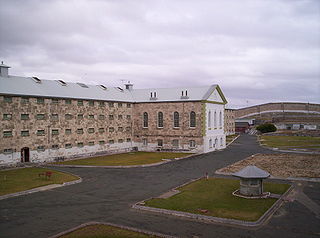
Electronic tagging is a form of surveillance which uses an electronic device, fitted to the person.

In criminal justice, particularly in North America, correction, corrections, and correctional, are umbrella terms describing a variety of functions typically carried out by government agencies, and involving the punishment, treatment, and supervision of persons who have been convicted of crimes. These functions commonly include imprisonment, parole and probation. A typical correctional institution is a prison. A correctional system, also known as a penal system, thus refers to a network of agencies that administer a jurisdiction's prisons and community-based programs like parole and probation boards;. This system is part of the larger criminal justice system, which additionally includes police, prosecution and courts. Jurisdictions throughout Canada and the US have ministries or departments, respectively, of corrections, correctional services, or similarly-named agencies.
Probation and Parole Officers play a role in the criminal justice systems by supervising offenders released from prison or sentenced to non-custodial sanctions such as community service. In some jurisdictions probation and parole officers are involved in presenting reports on offenders and making sentencing recommendation to courts of law.

The Tennessee Department of Correction (TDOC) is a Cabinet-level agency within the Tennessee state government responsible for the oversight of more than 20,000 convicted offenders in Tennessee's fourteen prisons, three of which are privately managed by the Corrections Corporation of America. The department is headed by the Tennessee Commissioner of Correction, who is currently Tony Parker. TDOC facilities' medical and mental health services are provided by Corizon. Juvenile offenders not sentenced as adults are supervised by the independent Tennessee Department of Children's Services, while inmates granted parole or sentenced to probation are overseen by the Department of Correction (TDOC)/Department of Parole. The agency is fully accredited by the American Correctional Association. The department has its headquarters on the sixth floor of the Rachel Jackson Building in Nashville.

The New Hampshire Department of Corrections is an executive agency of the U.S. state of New Hampshire; charged with overseeing the state correctional facilities, supervising probation and parolees, and serving in an advisory capacity in the prevention of crime and delinquency. As of June 30, 2013, the Department had an inmate population of 2,791, 15,267 on probation or parole, and 893 total employees, 470 as corrections officers and 64 as probation/parole officers. The agency has its headquarters in Concord.

The Department of Prisons is a department of the Government of Sri Lanka responsible for the incarceration and rehabilitation of convicted criminal offenders and terror suspects, coming under the purview of the Minister of Prison Reforms, Rehabilitation, Resettlement and Hindu Religious Affairs. The Commissioner of Prisons reports to the Minister, who is in turn responsible to the Parliament of Sri Lanka.

The Alexander Maconochie Centre, an Australian minimum to maximum security prison and remand centre for male and female inmates, is located in Hume, Australian Capital Territory. The facility is operated by ACT Corrective Services, an agency of the Justice and Community Safety Directorate of the Government of Australian Capital Territory. The facility accepts felons charged under Territory and/or Commonwealth legislation pending legal proceedings; and also detains convicted felons who are sentenced to full-time imprisonment.
Correctional services are operated by both the federal and provincial governments. Offenders who receive sentences of less than two years or who receive community sentences such as fines, community service work or probation are under provincial jurisdiction. Offenders who receive prison sentences of two years or more are the responsibility of the federal government. Young offender services, including pre-trial supervision, community and custody sentences and Extrajudicial Sanctions Programs, are the responsibility of the provincial government.
Corrective Services New South Wales (CSNSW) is a division of the Department of Communities and Justice of the Government of New South Wales, Australia. CSNSW is responsible for the State's prisons, a juvenile detention centre, and a range of programs for managing offenders in the community. The agency traces its origins back to 1788, when NSW was founded as a penal colony.
The San Bernardino County Probation Department serves San Bernardino County, California, which is geographically the largest county in the lower 48 states. The Probation Department supervises juvenile and adult probationers. The department operates two juvenile hall facilities, provides recommendations to the court, and has numerous specialized units to serve the citizens and courts of San Bernardino County.
Ontario Correctional Services provides custody, treatment and rehabilitation programs for adult offenders who are sentenced to imprisonment for up to two years less one day. It also provides probation and parole services and supervises persons awaiting trial, sentencing, transfer, deportation and other judicial proceedings.
Rehabilitation policies are those that intend to reform criminal offenders rather than punish them or segregate them from the greater community.

Punishment in Australia arises when an individual has been convicted of breaking the law through the Australian criminal justice system. Australia uses prisons, as well as community corrections. The death penalty has been abolished, and corporal punishment is no longer used. Prison labour occurs in Australia, prisoners are involved in many types of work with some paid as little as $0.82 per hour. Before the colonisation of Australia by Europeans, Indigenous Australians had their own traditional punishments, some of which are still practised.
The New Zealand Parole Board is an independent statutory body established in 2002 that considers offenders for parole. Its task "is to undertake an assessment of the risk that long-term sentenced offenders might pose to the safety of the community if they were to be released before the end of their sentence". The Board also sets conditions of release for offenders so their reintegration back in to the community can be effectively managed. Once the conditions are set it becomes the responsibility of Community Corrections to manage the offender." 'Long term' is defined as more than 24 months. Short-term prisoners are automatically released after serving half their sentence.
The New Zealand Probation Service is a branch or service of the New Zealand Corrections Department. Established in 1886, its role is to manage offenders sentenced to community based sentences such as home detention, community detention and intensive supervision. The Service also manages prisoners in the community who have been released on parole and offenders on release conditions at the end of their prison sentence. According to Corrections website, in 2014 the Service was looking after approximately 30,000 offenders in the community. The Probation Officer's role is described as "work(ing) with people on probation to motivate them to make changes in their lives. This may include attending programmes to address violence, alcohol and drug abuse or driving offences."

Juvenile detention in the Northern Territory is administered by the Department of Correctional Services of the Government of the Northern Territory. Juvenile detention is mostly operated through two facilities - the Alice Springs Juvenile Holding Centre in Alice Springs, and the Don Dale Juvenile Detention Centre in eastern Darwin. A juvenile is a child between the age of 10 and 17.
Periodic detention or weekend detention is a type of custodial sentence under which the offender is held in prison between Friday and Sunday evenings each week, but is at liberty at other times. Promoted by prison reformers as an alternative to imprisonment, periodic detention drew praise for allowing offenders to continue working, maintain family relationships, and avoid associating with more dangerous criminals in traditional prisons. It was also considerably less expensive to administer.
The New South Wales Department of Communities and Justice, a department of the Government of New South Wales, is responsible for the delivery of services to some of the most disadvantaged individuals, families and communities; and the administration and development of a just and equitable legal system of courts, tribunals, laws and other mechanisms that further the principles of justice in the state of New South Wales, Australia. It also provides services to children and young people, families, people who are homeless, people with a disability, their families and carers, women, and older people. The department is the lead agency of the Stronger Communities cluster of the New South Wales government.











